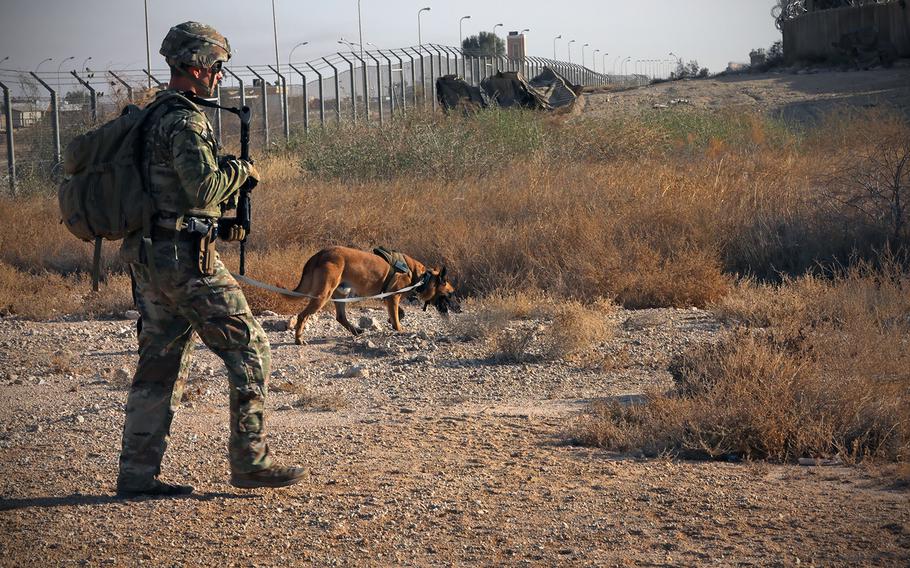
Polish engineer soldiers from Task Force Minecraft and a U.S. Military Working Dog Soldier assist a Base Operating Support Integrator engineer Soldier with base perimeter inspections at Al Asad Air Base, Iraq, Jan. 27, 2021. (Armando Vasquez/U.S. Army National Guard)
WASHINGTON — The rocket attack on an air base in Iraq where American troops are stationed is a “troubling development” following the recent U.S. airstrike meant to deter attacks by Iranian-backed militia groups, the Pentagon’s chief spokesman said Wednesday.
“Nobody wants to see the situation escalate,” John Kirby told reporters at the Pentagon. “That is why when we conducted the strike last weekend in Syria, we said we believed it was measured and proportionate.”
Al Asad Air Base in Iraq was hit Wednesday morning by 10 rockets fired from multiple locations east of the base, according to Kirby. No injuries of U.S. service members have been reported, but an American civilian contractor suffered a “cardiac episode” while taking shelter and later died.
The rocket attack comes after the U.S. airstrike last Thursday on a compound in Syria manned by Iranian-back militia groups that included Kait’ib Hezbollah and Kait’ib Sayyid al-Shuhada, which U.S. officials believe were behind other recent attacks against American and Iraqi forces.
Al Asad Air Base was also the site of the Jan. 8, 2020, ballistic missile attack by Iran in retaliation for the death of Maj. Gen. Qassem Soleimani, the commander of Iran’s elite Quds Force. More than 100 American service members suffered traumatic brain injuries from the attack.
On Wednesday, Iraqi security forces were at al Asad investigating, and U.S. officials have yet to determine who is responsible for the attack or the extent of the damage, Kirby said. However, he did say the use of rockets is similar to previous attacks by Shia militias backed by Iran.
The base’s Counter-Rocket, Artillery, Mortar, or C-RAM systems, were engaged, but it is unclear how effective it was during the rocket attack. The C-RAM might have shot down other rockets or some of the impacts were from the rockets that were first hit by the system, Kirby said, but that is still being determined.
Last week, Kirby said the U.S. airstrike in Syria was meant to eliminate the compound’s use and send a “deterrence message” about any future attacks against Americans and Iraqis.
“And I said back then that we hope it will have a deterrent effect. We still do. So, nobody wants to see this escalate into as you described it, a tit for tat. That is not in our interest, it’s not in the Iraqi people’s interest,” Kirby said.
However, if the United States does decide to respond against those responsible for the al Asad attack, it will do so “in a manner of our own choosing,” Kirby said.
The activities of Iranian-backed militia groups in the region has been a concern for the United States for a long time, Kirby said, and he called out the previous administration’s actions regarding Iran as counterproductive, including its “maximum pressure campaign.”
“[The campaign] only emboldened Iran further to pull back its commitments under the [Iran nuclear deal] and certainly has done nothing to limit, constrain or curtail their other malign activities,” he said. “Because the previous administration pulled out of the Iran deal, now there’s no direct method of communicating as there was before.”